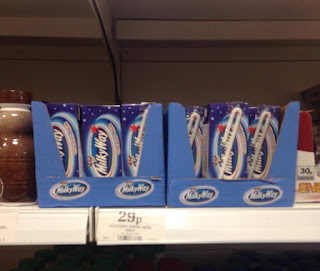Childhood obesity: why we should slash sugary drinks
Food for thought: around 30% of sugar in our youngsters' daily diet stems from sugary drinks.
Although the chocolatey concoction to your right (a carton of chocolate 'milk' by Milky Way) may resemble a cheap and convenient way of satisfying our youngsters' sweet tooth - particularly if they're tempted by the tasty treats that have been transformed into a delicious drink - the staggering 17.2g of sugar per 180ml serving not only resembles the reason why we should slash sugary drinks from their daily diet, but a core culprit that's responsible for our children's overconsumption of the sweet stuff.
Instead of increasing the incidence of childhood obesity (and a multitude of medical complications such as type 2 diabetes and dental decay) by buying this sweet source of fluid, slash their sugar intake by opting for skimmed (fully skimmed isn't suitable for children under the age of five) or semi-skimmed milk - a satisfying source of calcium that's free from the added sugars that we need to avoid - or a flavoursome fluid such as sparkling water served with a fresh slice of lemon or lime, as opposed to the moreish 'milk' that's bursting with an abundance of added sugar.
Top tip: not all sugars need to be ditched from our children's diet.
Although both adults and children should aim to avoid added sugar - the free type that has been added by manufacturers, chefs and consumers as well as that found in sources such as syrups, honey and fruit nectars - we don't need to slash the sweet stuff found in whole fruit, vegetables and plain milk - the intrinsic type found in foods that are not only bursting with beneficial nutrients including vital vitamins, minerals, antioxidants and fibre, but contribute to our five a day.
*If you do succumb to satisfying your youngsters stomaches with a fruit juice or smoothie, limit their intake to one 125-150ml glass a day and encourage them to enjoy it with a main meal in order to reduce their risk of dental decay.
www.twitter.com/BunsandGunsUK
www.bunsandguns.co.uk
Although the chocolatey concoction to your right (a carton of chocolate 'milk' by Milky Way) may resemble a cheap and convenient way of satisfying our youngsters' sweet tooth - particularly if they're tempted by the tasty treats that have been transformed into a delicious drink - the staggering 17.2g of sugar per 180ml serving not only resembles the reason why we should slash sugary drinks from their daily diet, but a core culprit that's responsible for our children's overconsumption of the sweet stuff.
Instead of increasing the incidence of childhood obesity (and a multitude of medical complications such as type 2 diabetes and dental decay) by buying this sweet source of fluid, slash their sugar intake by opting for skimmed (fully skimmed isn't suitable for children under the age of five) or semi-skimmed milk - a satisfying source of calcium that's free from the added sugars that we need to avoid - or a flavoursome fluid such as sparkling water served with a fresh slice of lemon or lime, as opposed to the moreish 'milk' that's bursting with an abundance of added sugar.
Top tip: not all sugars need to be ditched from our children's diet.
Although both adults and children should aim to avoid added sugar - the free type that has been added by manufacturers, chefs and consumers as well as that found in sources such as syrups, honey and fruit nectars - we don't need to slash the sweet stuff found in whole fruit, vegetables and plain milk - the intrinsic type found in foods that are not only bursting with beneficial nutrients including vital vitamins, minerals, antioxidants and fibre, but contribute to our five a day.
*If you do succumb to satisfying your youngsters stomaches with a fruit juice or smoothie, limit their intake to one 125-150ml glass a day and encourage them to enjoy it with a main meal in order to reduce their risk of dental decay.
www.twitter.com/BunsandGunsUK
www.bunsandguns.co.uk



Comments
Post a Comment